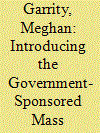|
|
|
Sort Order |
|
|
|
Items / Page
|
|
|
|
|
|
|
| Srl | Item |
| 1 |
ID:
165166


|
|
|
|
|
| Summary/Abstract |
When and where do states coercively alter their internal demography? We build a theory that predicts under what conditions states alter the demographic “facts on the ground” by resettling and expelling ethno-national populations. We predict that, under particular scope conditions, states will employ demographic engineering to shore up control over (1) nonnatural frontiers, and (2) areas populated by ethnic minorities who are co-ethnics with elites in a hostile power. We then substantiate our predictions using new subnational data from both China and the USSR. Causally identifying the spatially differential effect of international conflict on demographic engineering via a difference-in-differences design, we find that the Sino-Soviet split (1959–1982) led to a disproportionate increase in the expulsion of ethnic Russians and resettlement of ethnic Han in Chinese border areas lacking a natural border with the USSR, and that resettlement was targeted at areas populated by ethnic Russians. On the Soviet side, we similarly find that the Sino-Soviet split led to a significant increase in expulsion of Chinese and the resettlement of Russians in border areas, and that resettlement was targeted at areas populated by more Chinese. We develop the nascent field of political demography by advancing our theoretical and empirical understanding of when, where, and to whom states seek to effect demographic change. By demonstrating that both ethnic group concentration and dispersion across borders are endogenous to international conflict, our results complicate a large and influential literature linking ethnic demography to conflict.
|
|
|
|
|
|
|
|
|
|
|
|
|
|
|
|
| 2 |
ID:
161238


|
|
|
|
|
| Summary/Abstract |
Global warming has become the buzz-word of the twenty-first century discourse on climate change and environment. Global scientists, political leaders from across the world, Non-governmental organizations, civil-society, legal community, and media are breaking their heads to engineer the climate and reverse the ever growing trends of global warmingfor its given consequences. Another approach that is being emphasised and is into practice as well is the concept of sustainable development. However, the scientific and popular debate that ensued over the last couple of decades over the causes and impact of climate change seems to have ignored the subject of demographics that has the main bearing upon every wrong that is happening to the environment.
|
|
|
|
|
|
|
|
|
|
|
|
|
|
|
|
| 3 |
ID:
187559


|
|
|
|
|
| Summary/Abstract |
This article introduces the Government-Sponsored Mass Expulsion (GSME) dataset documenting cross-border mass expulsion episodes around the world from 1900 to 2020. This new dataset focuses on mass expulsion policies in which governments systematically remove ethnic, racial, religious or national groups, en masse. The GSME dataset disaggregates mass expulsion from other exclusionary politics concepts to isolate policies of intentional group-based population removal. This allows for a systematic examination of governmental expulsion policies, distinct from policies aimed at annihilation (genocide), control (massacre) or cultural elimination (coercive assimilation). The GSME dataset documents 139 expulsion episodes since 1900, affecting over 30 million citizens and non-citizens across all world regions. The data are drawn from archival research conducted at the United Nations High Commissioner for Refugees and the International Committee of the Red Cross, as well as secondary sources and extant datasets. This article presents an empirical overview of the data including information on the expelling country, onset, duration, region, scale, category of persons expelled, and frequency. Although mass expulsion is a rare event, it is a reoccurring rare event. Its consistent use – with over two million people expelled in the last five years alone – demands additional empirical and theoretical investigation. The GSME dataset contributes to the study of exclusionary politics as a dependent variable, but it also offers promise as an explanatory variable for those studying phenomena affected by mass expulsion.
|
|
|
|
|
|
|
|
|
|
|
|
|
|
|
|
|
|
|
|
|